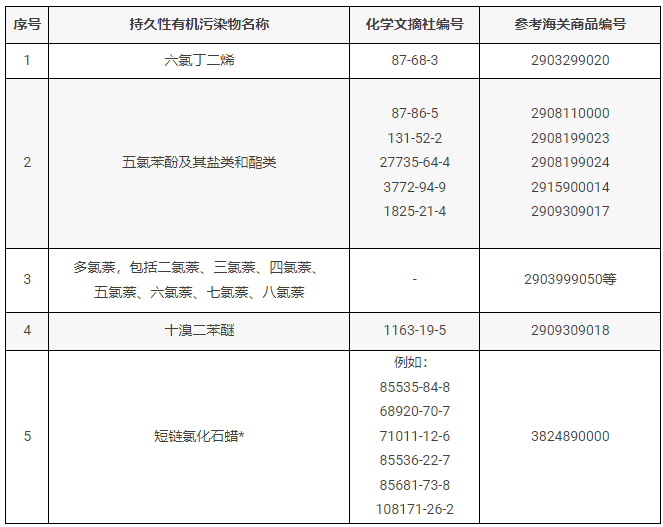Effective immediately! The production, use, import and export of five types of persistent organic pollutants, including polychlorinated naphthalene, will be banned
On December 30, 2022, At its thirty-eighth session, the Standing Committee of the Thirteenth National People's Congress considered and approved the Amendments to the Stockholm Convention on Persistent Organic Pollutants to include three Types of Persistent Organic Pollutants, including polychlorinated Naphthalene, and the Amendments to the Stockholm Co
On December 30, 2022, At its thirty-eighth session, the Standing Committee of the Thirteenth National People's Congress considered and approved the Amendments to the Stockholm Convention on Persistent Organic Pollutants to include three Types of Persistent Organic Pollutants, including polychlorinated Naphthalene, and the Amendments to the Stockholm Convention on Persistent Organic Pollutants to include three types of Persistent Organic Pollutants, including short-chain Chlorinated paraffins (below Collectively referred to as the Amendments).
The Amendment is effective for our country on June 6, 2023.
The Amendments provide for the phase-out or restriction of five persistent organic pollutants, hexachlorobutadiene, polychloronaphthalene, pentachlorophenol and its salts and esters, decabromodiphenyl ethers and short-chain chlorinated paraffins. In combination with China's relevant management regulations, the specific matters of limiting the control of the above 5 types of persistent organic pollutants are announced as follows:
It is prohibited to produce, use, import and export hexachlorobutadiene, polychloronaphthalene, pentachlorophenol and their salts and esters.
The production, use, import and export of decabromodiphenyl ether is prohibited (except for the following purposes).
(a) textile products (excluding clothing and toys) that need to have flame retardant characteristics;
(b) additives for plastic housing and parts used in household heating appliances, irons, fans, immersion heaters, containing or in direct contact with electrical parts, or subject to flame retardant standards, with a density of less than 10% by weight of the part;
(c) polyurethane foam for building insulation;
The < div > & have spent The exemption period for the above three types of uses will expire on 31 December 2023.
It is prohibited to produce, use, import and export short-chain chlorinated paraffins (except for the following purposes).
(a) additives used in the production of conveyor belts in the natural and synthetic rubber industries;
(b) Spare parts for rubber conveyor belts used in mining and forestry;
(c) the leather industry, in particular the fatting of leather;
(d) lubricating oil additives, in particular for engines used in automobiles, electric generators and wind energy installations, as well as oil and gas exploration drilling and refineries for the production of diesel oil;
(V) outdoor decorative lamp;
(vi) waterproof and flame retardant paint;
(7) adhesive;
(viii) Metal processing;
(ix) Second plasticizer of flexible polyvinyl chloride (but shall not be used in the processing of toys and children's products);
The < div > & have spent The exemption period for the above nine types of uses will expire on 31 December 2023.
Enterprises, public institutions and other producers and operators that discharge hexachlorobutadiene and polychloronaphthalene shall take effective measures to effectively reduce the discharge or eliminate the sources of discharge. Encourage the development and application of alternative technologies to prevent the formation and release of hexachlorobutadiene and polychloronaphthalene.
Unless otherwise specified, chemical substances used in laboratory-scale research or as reference standards, chemical substances occurring in products and articles as unintentional trace contaminants, shall not be subject to the above prohibition or restriction of production, use, import and export requirements.
All levels of ecological environment, industry and information technology, housing urban and rural construction, agriculture and rural areas, commerce, emergency management, market supervision and management, disease prevention and control and other departments and customs, in accordance with the relevant laws and regulations of the State, should strengthen the production, use, import and export of the above five types of persistent organic pollutants supervision and management. Once violations of the public announcement are found, they will be dealt with severely in accordance with the law.
7. This announcement shall come into force on June 6, 2023.
Note: Short-chain chlorinated paraffins are straight-chain chlorinated hydrocarbons with chain lengths C10 to C13 and a chlorine content of more than 48% by weight and a concentration of 1% or greater by weight in the mixture.




 Consultation
Consultation
 400-115-9001
400-115-9001